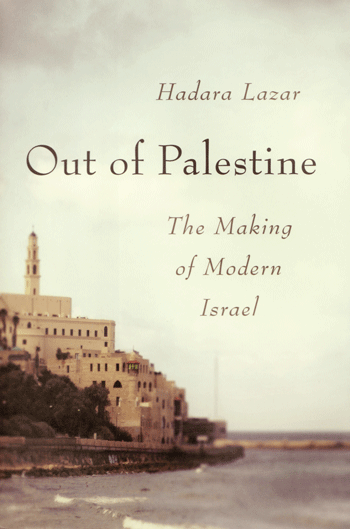Reviewed by NEAL GENDLER
Haifa-born Hadara Lazar calls Britain’s Palestine Mandate a period of great expectations, “central to the Israeli myth,” but for her, both real and undefined.
So over a quarter-century, she interviewed people who lived through it — more than 100 Arabs, British and Jews — to create not a history but “a work of testimony…of remembrance.”
The result is an unusual and interesting array of views, especially from Brits who tried to keep the place running amid growing chaos, and from Arabs who recall the collapse of their world without propagandistic bombast.
We also hear a lot from Lazar, who does well at creating context — including impressions of her subjects and their physical surroundings — but whose insertion of herself sometimes gets confusing and close to overwhelming her concept. Editing and proofreading errors are outweighed by a useful list of interviewees and a 10-page chronology. Alas, there’s no index.
Although age and passage of decades can deepen memory’s rose tint, most of Lazar’s subjects suggest that until British rule became ineffective, life for the educated and better off was pleasant, the British bringing modern infrastructure and a veneer of gentility. To British Army volunteer and later Knesset member Yitzhak Ben-Aharon, “Englishness was not something foreign — not mine, but not foreign.”

The King David Hotel appears as the center of social life for those who could afford it.
“I don’t know whether a day passed when I was away from the King David,” Naser al-Din Nashashibi, a mandate official who became a writer, told Lazar in his London apartment. “If I didn’t go to lunch, I went in the evening… It was very clean, very snobbish and my headquarters. I had my hair cut there, my drinks there. I met my friends there.”
Journalist Gabriel Zifrani called it “the gathering place between the Atlantic and Indian oceans” for people from all corners of the empire.
Arabs, Jews and British did coexist, and many Arabs and Jews were friends before circumstances forced them to take sides. Each group seemed to view its relations with the others differently.
One Brit, a polite former administrator, differentiates between “the Jews” and “the people” and calls the notorious 1939 White Paper restricting Jewish immigration “a sensible policy.”
Some Arabs make clear that they saw Palestine as theirs, wrested away by outsiders. Jews, however, had “a burgeoning sense of identity with their own land, protected by British rule,” Lazar says. “The Mandate allowed them to create a society, but not a state.”
Lazar mentions the cliché that British administrators would arrive pro-Zionist and depart pro-Arab. While some Brits were favorable to Jews, others were anti-Semitic from the start, Lazar and her subjects say that the British generally found the Arabs charming, hospitable and easygoing. Jews often appeared demanding, rude, unpolished and pushy. Manners aside, Jews were in a hurry — and they became increasingly, aggressively impatient.
Having promised Jews a homeland in the 1917 Balfour Declaration, and having made broader, less specific promises to Arab allies, the British were carriers of competing dreams, Lazar says. But Britain had lopped off 78 percent of the Mandate to create Transjordan, and the Arabs increasingly refused to accept the Jewish dream for the remaining 22 percent, turning violent.
“The reality became more difficult to ignore,” she says, and “the British abandoned their special role as the carriers of the dreams and reverted to being rulers.”
In 1947, they gave up. Walking out six months later disturbed administrator Earl Julian of Oxford and Asquith.
“A lot of the places we served got into difficulties if not civil wars after we left,” he told Lazar. “But Palestine was different,” not a colony, not turned over to a government, but abandoned. “There was nothing more one could do, and one was going home, and that was the worst, one was leaving it to chaos.”
Could things have ended differently? Maybe. Few of Lazar’s interviewees make the point, but after the UN vote for partition into two nations, the Arabs could have said yes.
***
Neal Gendler is a Minneapolis writer and editor.
(American Jewish World, 1.6.12)



















